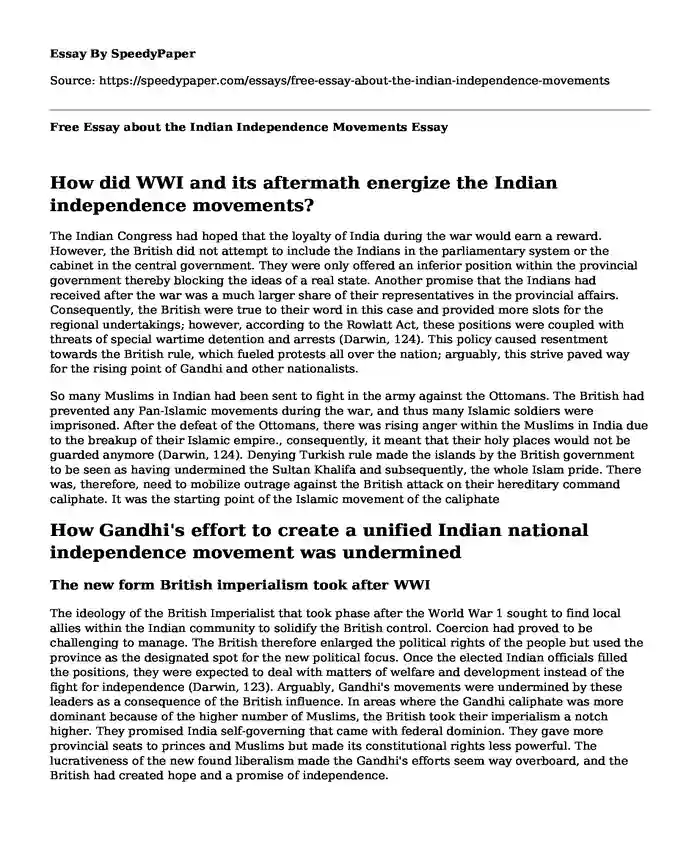How did WWI and its aftermath energize the Indian independence movements?
The Indian Congress had hoped that the loyalty of India during the war would earn a reward. However, the British did not attempt to include the Indians in the parliamentary system or the cabinet in the central government. They were only offered an inferior position within the provincial government thereby blocking the ideas of a real state. Another promise that the Indians had received after the war was a much larger share of their representatives in the provincial affairs. Consequently, the British were true to their word in this case and provided more slots for the regional undertakings; however, according to the Rowlatt Act, these positions were coupled with threats of special wartime detention and arrests (Darwin, 124). This policy caused resentment towards the British rule, which fueled protests all over the nation; arguably, this strive paved way for the rising point of Gandhi and other nationalists.
So many Muslims in Indian had been sent to fight in the army against the Ottomans. The British had prevented any Pan-Islamic movements during the war, and thus many Islamic soldiers were imprisoned. After the defeat of the Ottomans, there was rising anger within the Muslims in India due to the breakup of their Islamic empire., consequently, it meant that their holy places would not be guarded anymore (Darwin, 124). Denying Turkish rule made the islands by the British government to be seen as having undermined the Sultan Khalifa and subsequently, the whole Islam pride. There was, therefore, need to mobilize outrage against the British attack on their hereditary command caliphate. It was the starting point of the Islamic movement of the caliphate
How Gandhi's effort to create a unified Indian national independence movement was undermined
The new form British imperialism took after WWI
The ideology of the British Imperialist that took phase after the World War 1 sought to find local allies within the Indian community to solidify the British control. Coercion had proved to be challenging to manage. The British therefore enlarged the political rights of the people but used the province as the designated spot for the new political focus. Once the elected Indian officials filled the positions, they were expected to deal with matters of welfare and development instead of the fight for independence (Darwin, 123). Arguably, Gandhi's movements were undermined by these leaders as a consequence of the British influence. In areas where the Gandhi caliphate was more dominant because of the higher number of Muslims, the British took their imperialism a notch higher. They promised India self-governing that came with federal dominion. They gave more provincial seats to princes and Muslims but made its constitutional rights less powerful. The lucrativeness of the new found liberalism made the Gandhi's efforts seem way overboard, and the British had created hope and a promise of independence.
The challenges of rival Indian sub-nationalisms
The ideas proposed by the Indian nationalists were different from those of Gandhi. They had campaigned for self-governance long before the World War 1 in 1880, but, their idea of self-rule was different. They admired the British administration and the civil service and how the building blocks in their government's hierarchy worked in discharging their administrative duties (Darwin, 124). They wanted an idealized self-governing country that was still under the crown, like Canada. Therefore, their ambition was to take charge of the already created British Indian State and administrate it the same way the colonialist had done. Gandhi, on the other hand, was looking for the independence of India based on religious beliefs; consequently, he was a reformer who sought moral and social improvement through the use of religion. However, his ideologies on the ethical conduct and ideals could not suffice within a colonial kingdom that had not granted freedom for everyone. He, therefore, wanted independence to a self-sufficient community that could be free to practice his idealized moral and social structure (Darwin, 125). Their difference in ideologies made the nationalist regard Gandhi as a meddlesome citizen, which resulted in their determination to undermine his movements.
References
Darwin, John. After Tamerlane: the global history of empire since 1405. Bloomsbury Publishing USA, 2008.
Cite this page
Free Essay about the Indian Independence Movements. (2022, Apr 25). Retrieved from https://speedypaper.com/essays/free-essay-about-the-indian-independence-movements
Request Removal
If you are the original author of this essay and no longer wish to have it published on the SpeedyPaper website, please click below to request its removal:
- Free Essay Example on Social Vulnerability
- Healthcare Essay Sample on Measles in Southern Africa
- Tax Evasion in Oman, Essay Example for Everyone
- Deploy and Administer Windows Server 2012
- Free Essay on the Rise of Silas Lapham by William Dean Howells
- Essay Sample about Titus Flavius Josephus "Joseph Ben Matthias" and His Works
- Jane Eyre's Relations to Conflicts, Character Analysis Essay Example
Popular categories





